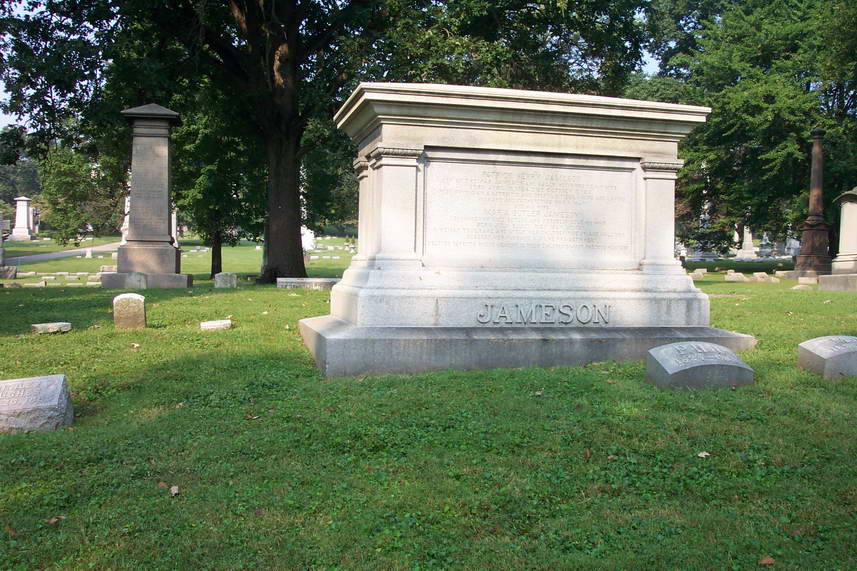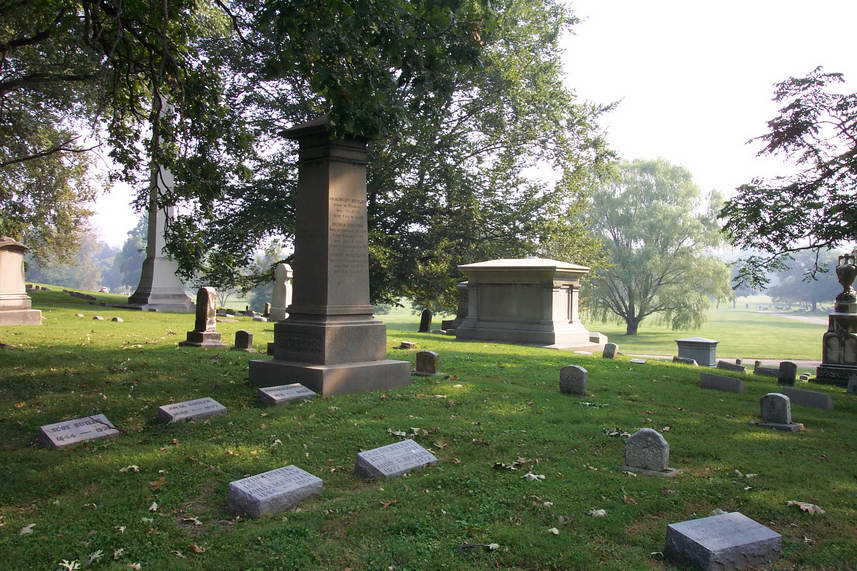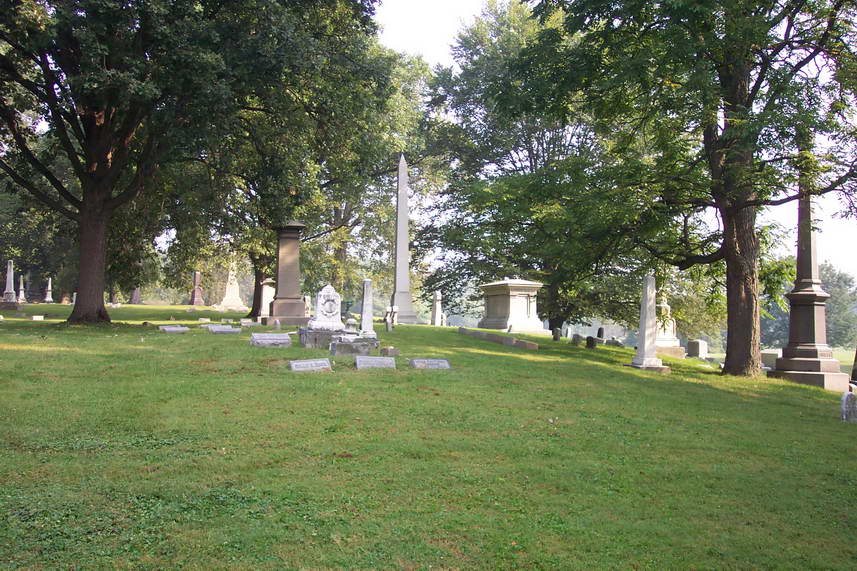Ovid Butler
1801-1881

Biographical Sketch On The Life Of Ovid Butler
Ovid Butler was born February 7, 1801 in Augusta, New York. His father Chancey Butler was one of the earliest preachers in the Restoration Movement in Indiana, as the family moved there in 1817 when Ovid was sixteen years of age. They settled in Jennings County, Indiana. He studied law and became a lawyer practicing in Shelbyville, Indiana from 1825 to 1836. During this time he met and married Cordelia Cole.
The Butlers then moved to Indianapolis in 1836. Two years after arriving in Indianapolis Cordelia died. Later he married Mrs. Elizabeth A. Elgin, the daughter of Thomas McQuat. He established a law firm, where for the next eleven years he built a profitable business. He had three law partners: Calvin Fletcher, Simon Yanders and Horatio C. Newcomb.
He was very interested in the issues that plagued the day, namely slavery in the U.S. In 1849 he established a paper called, Free Soil Banner in Indianapolis. It was a political paper with much emphasis on anti-slavery. In 1849 due to bad health he gave up his law practice bringing an early retirement.
In addition to a love for the law, his pious spirit drove him to know and live for Jesus all his life. He preached the old time gospel and desired that education for young men and women in the ways of truth was a great need in society. Until that point churches of Christ had schools of preaching, and general Bible training schools, but as yet no university in the state. The Christian Record for December, 1847 recorded: "We, the undersigned, being a committee appointed at the last State meeting of the Church of Christ held at Greensburg, for the purpose of locating a college at some point in the State." Then it was signed by Ovid Butler, Elijah Goodwin, L.H. Jameson, and M.B. Hopkins, Committee"
On January 15, 1850 the Indiana General Assembly approved a school for the Christian Movement. Over the next five years Butler labored raising $75,000 for its establishment. He initially purchased some property on the outskirts of Indianapolis for $4000.00 that was approved by a board of directors including: John O'Kane, T. P. Connelly, J.M. Mathes and others. On November 1, 1855 the North Western Christian Christian University opened its doors. Butler served as the head of the Board of Directors for the next sixteen years retiring because of bad health at the age of seventy, 1871. He was made Chancellor of the University. In his honor the University received a new name, Butler University after its loyal founder and builder on February 28, 1877.
He spent the last years of his life with his family at home. Ovid Butler died July 12, 1881 in Indianapolis, Indiana and is buried in the Crown Hill Cemetery. His second wife, Elizabeth died a year later in 1882.
![]()
Ovid Butler
Ovid Butler was born February 7, 1801, in August, New York, and died in Indianapolis, Indiana, July 12, 1881. His father, the Rev. Chauncey Butler, was the first pastor of the Disciples church in Indianapolis. He died in 1840. His grandfather. Capt. Joel Butler, was a Revolutionary War soldier, and served in the disastrous Quebec expedition. He died in 1822. In 1817 the family removed from New York to Jennings County, Indiana, where Ovid Butler resided until he arrived at years of manhood. He taught school for a few years; studied law, and in 1825 settled in Shelbyville, where he practiced law, and in 1825 settled in Shelbyville, where he practiced law til 1836, when he removed to Indianapolis, ever afterward his home. He practiced law up to 1849, when on account of failing health he was obliged to give it up. Thereafter he devoted his life mainly to the Christian Church and the Northwestern Christian University (now Butler), with which was his great memorable work, the institution now bearing his name. He was for twenty years its president, retiring in 1871, at the age of seventy. He was first a Democrat, then a Free Soiler, and later a Republican. He married in 1827 Cordelia Cole, who died in 1838, and in 1840 he married Mrs. Elizabeth A. Elgin, nee McOuat, who survived him many years.
-Greater Indianapolis: The History, the Industries, the Institutions, and the People of a City of Homes, Volume 2, page 1165.
![]()
OVID BUTLER, SENIOR.
The subject of this sketch is one of a very small class of men who would rather do good than to be known to do it. No man in the city has been more efficient, and few less conspicuous in all good works than he; not a little of it has been of a character that necessarily made it public, but more has followed closely the scriptural injunction and come from one hand without the knowledge of the other. He has always used his power for the service and not fo; the credit there was in it, and the possession of an ample fortune has enabled him to find the service just where more conspicuous philanthropists fail. He has never hesitated to put his money where his convictions directed, and has thus been the real prop of public efforts that bore the names of other men. He has been a "reformer" in all senses, from religion to politics. His first religious connection was with a denomination known distinctively as Reformers, and his first political association was with the inti-slavery sentiment and against the servility of northern feeling. Wherever he, has seen evil he has fought it ; and like Sidney Smith, what he thought evil in the outset of his career, he thinks evil now. To him is mainly due the philanthropic organizations of the Christian church in this State, especially its most permanent and pervading achievement, the university, appropriately named for him; and to him is due the first steps in the construction of that political force. which first overthrew the slavery subservience of Indiana. He projected the university, perfected its plans, and presided over it development; and he led the way in the summons that arrayed the People's party, as it was called in 1854, against the abuses of that time. Historians record the first of these efforts, but nothing preserves the memory of the other but this notice. No one will imagine that the People's movement would not have taken place by a spontaneous impulse, if there had been no leader to solidify the feeling into action by showing the way to act, but the movement was all the more effective for being so promptly organized-and that was the suggestion of Mr. Butler. That temporary party was the precursor of the Republican party two years later.
In a quiet way, which alone would be in harmony with his retiring, unobtrusive disposition, he has ceaselessly been engaged in some work or other of disinterested service ever since he gave up his private business thirty years ago. For nearly a whole generation his occupation has been for the good of other people.
Ovid Butler, Senior, was born on the 7th of February, 1801, in Augusta, Oneida county, New York. His father and grandfather were from Vermont, and preachers of the Baptist persuasion. The former, the Rev. Chauncey Butler, however, entered what was called the Reformation, in later life, and died as the first pastor of the Christian church in this city, in 1840. The latter, Captain Joel Butler, was a Revolutionary soldier, and served in the disastrous Quebec expedition; he died in Jennings county, in this State, in 1822.
Mr. Butler received only a common school education in his youth—when comman(sic) schools were by no means what they are now. His father removed to this State in 1817—one year after its admission into the Union-and settled in Jennings county, where his grandfather was living. In 1822, when just of age, he went to Illinois, to try his fortune but failed, and returned to Vernon, where he kept a dry goods and grocery store for a year or two. In 1824 he quit trade to study law, and was admitted to the bar in 1825, subsequently getting admission to the Supreme Court and the Federal Courts at Shelbyville, where he went in the fall of 1825. In Shelby county his ability and high character I gave him an early and considerable prominence, and he held several minor offices; was a candidate for the Legislature, but beaten by his anti-slavery views, and was also beaten for the county clerkship. He regards these defeats and his consequent exclusion from politics as blessed dispensations, and justly enough. Many a good man has been spoiled into a politician by the bad luck of success at the outset.
In 1833 he joined the Reformed or Christian church, having been a little inclined to skepticism in his early life. His wife, Cordelia, a daughter of Judge Cole, of New York, whom he had married in 1827, joined with him. Early in 1836, on the invitation of Calvin Fletcher, Senior, he came to this city and formed a partnership with that gentleman, which was maintained with great success and mutual respect and good feeling for eleven years, when in 1847 ill-health compelled Mr. Butler to retire, and he has since lived, as already remarked, more for the benefit of others than himself, at his beautiful residence called Forest Home (then a primeval forest), at the corner of Home and Central avenues. In 1838 his wife died and in 1840 he married Mrs. Elgin, a daughter of Thomas McOuat of this city. His eldest daughter, Cordelia, by his first wife, married William Wallace of this city in 1847, and died in 1866; his second daughter, Maria, married Dr. P. H. Jameson in 1850, and with his son Ovid, Junior, by his first wife, and Scot, by his second wife, are still living, as are also several younger children. One daughter of the second wife died some years ago and the "Demia Butler Chair " was endowed with ten thousand dollars by her father in memory of her.
Although Mr. Butler never held a political office and has never been known as a politician, in fact, has never in the ordinary sense been a politician, he has always retained a lively interest in political movements and measures. He has not held it a proof of religious devotion that he should feel no concern for his mortal welfare, and has never spared time, talent or money in what he thought was for the public good. In 1848 he was made an electoral candidate on the Free Soil ticket, and again in 1852. About the year 1854 he furnished most of the means to establish a paper as the organ of the anti-slavery sentiment of the State, and the Free Democrat, under the direction of Mr. Rawson Vaile, was the result. In the fall of 1854, having formed an association to purchase the Journal of John D. Defrees, he allowed the new organ to be absorbed into the new purchase, and the Journal, under the direction of Berry R. Sulgrove and Mr. Vaile, became the leading anti-slavery paper of the State, the organ of the People's party and later of the Republican party, a position which it still holds. In 1857 he sold his interest in the Journal to Mr. Sulgrove at a serious sacrifice, thus illustrating anew his indisposition to make money of an enterprise conceived for public good. Besides this investment in political sentiment he contributed largely to starting an anti-slavery paper in Cincinnati, mainly with a view to repel the pro-slavery influence, then strong, if not dominant, in the Christian church. Upon his purchase of the Journal, he, as already remarked, took the first step in the organization of the People's party, a union of all elements that opposed the Democracy. By dint of hard argument and obvious facts he and his immediate friends forced some old Whig leaders into the movement, carried it through successfully to tumble to pieces when it had done the work of opening the way for the Republican party. He sympathised strongly with the European Revolution of 1848, and contributed liberally, though with little hope of good, to the Kossuth fund in 1852, when that eminent patriot visited this city as the guest of the State.
The great achievement of Mr. Butler's life, and that which alone will surelr outlive the earthly memory of his beneficence or perpetuate it with its own existence, is the Northwestern Christian University, as it was at first and for many years called. This is as wholly his work as any great institution can be any one man's work. He conceived the idea of it, gave it shape and consistence, devised the plan to carry it out, drafted the charter for it in 1849, which the Legislature passed in 1850, and supervised all the steps in its progress till it emerged an active and flourishing school, full of good service but more full of good promise. He was chairman of the board of commissioners first, and then, under the charter, chairman of the board of directors, a position he held as long as he cared to, or saw any benefit in the service. He donated the ground for the first building near his residence, and took immediate charge of the work, for which, at one time and another, he advanced ten thousand dollars; but for this the institution would have been several years behind its time, even if it had ever well got through it. In 1858 an allowance of two thousand dollars was made for his services-all he ever got and that he invested in the college. A year ago the name of the institution was changed from Northwestern Christian to Butler University. In 1875 he took sixty thousand dollars additional stock in the university to endow the Biblical department. Though for many years a recluse, rarely going out, except to church, and always something of an invalid, and though his "head is blossoming for the grave," Mr. Butler holds his great age well, his mind is as clear and his memory as strong as ever, and he promises to live for years to come the life of unostentatious beneficence which has so long constituted almost the whole of his earthly career.
-John H. B. Nowland, Sketches of Prominent Citizens of 1876, pages 523-526
![]()

North Western Christian University From 1855-1874

Home Of Butler University From 1875-1928

Home Of Butler University After 1928
Jordan Memorial Building

Butler University Today
![]()
Directions To The Grave Of Ovid Butler
Ovid Butler is buried in the Crown Hill Cemetery, Indianapolis, Indiana. Traveling On I-65 North Out Of Downtown Indianapolis, Indiana Take The Dr. Martin Luther King Street Exit - Exit 117. (Note: If you cross White River, You Have Gone Too Far) Go North On Dr. Martin Luther King Street. Turn Right On West 32nd Street. Cemetery Will Be On Your Left. Go Until The Road Dead Ends Into Boulevard And Turn Left. There Will Be An Entrance To The Cemetery As You Cross The 34th Street Intersection. Turn Left Into The Cemetery. Lot 14, Section 6. Butler's grave is in the same section as son-in-law, Patrick H. Jameson. See map of cemetery here! Section 6, Lot 14 is the location. The actual GPS location of the grave is: 39°49'11.9"N 86°10'28.8"W / or D.d. 39.819961, -86.174675

Note Butler Plot To The Left if Dr. P.H. Jameson





![]()
Note: Special thanks is extended to Terry J. Gardner of Indianapolis, Indiana for grave photos and supplying information of the final resting place of Ovid Butler. Some information and the Butler University pictures were taken from Disciples Of Christ In Indiana, by Commodore Wesley Cauble c.1930
![]()